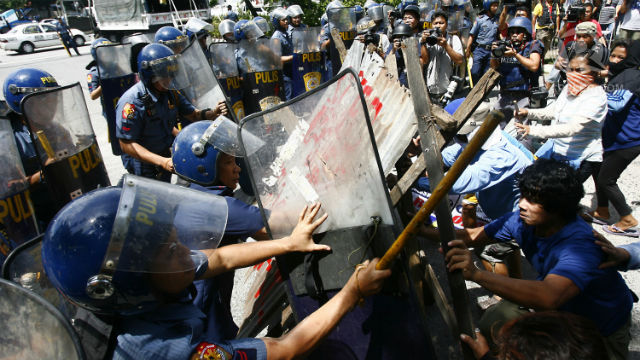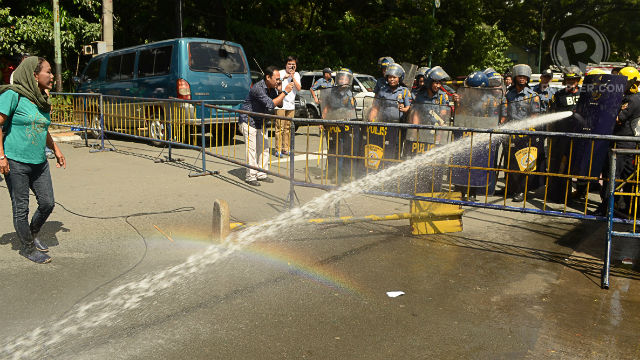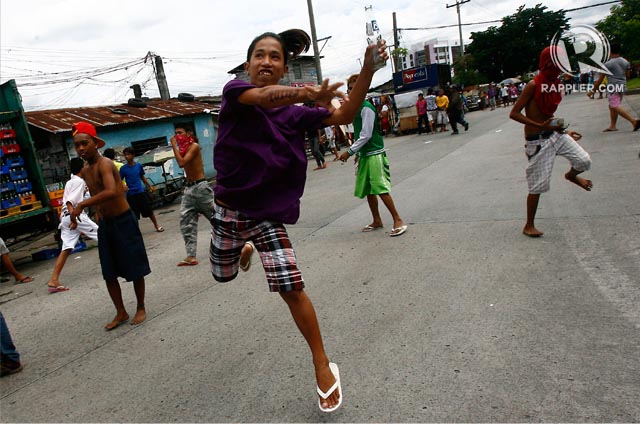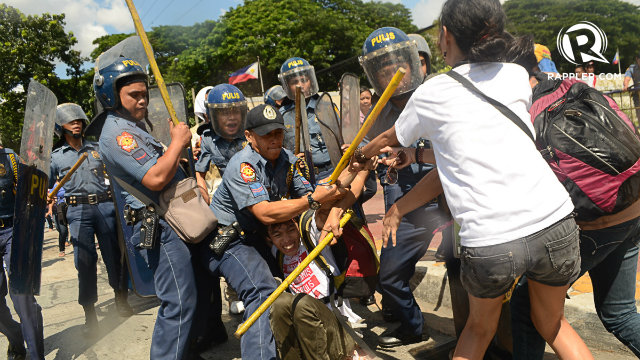SUMMARY
This is AI generated summarization, which may have errors. For context, always refer to the full article.

MANILA, Philippines – A demolition plan turned violent on Monday, July 1, as informal settlers clashed with policemen along Agham Road in Quezon City.
Informal settlers threw rocks, broken glass, and feces at policemen, who in turn fired shots to control the area.
The protesters then marched to the Quezon City hall where they held a program to protest the demolition plans. They were joined by other militant groups like Kabataan, Anakpawis and Kadamay.
The police resorted into violence as the militants tried to enter the city hall. They were dispersed by policemen via water cannons. Two people were injured from the side of the militants.
Anakbayan chairperson Vencer Crisostomo said that the demonstrators merely wanted to have a dialogue with the Quezon City government but they were instead answered with violence.
“Nagdedemand ang urban poor groups ng sagot sa Quezon City government kung bakit nagkakaroon ng demolisyon sa hanay ng mga maralita at ang hinarap sa kanila ng mga pulisya,” Crisostomo said.
(The urban poor groups demanded answers from the Quezon City government regarding the demolitions. They were, instead, faced with police barricades.)

Quezon City Police District (QCPD) station 2 superintendent Pedro Sanchez said that two policemen were injured.
Atty. Tiffany Herona of the Commission on Human Rights said that they are closely monitoring the protests.
“We ordered our NCR office to monitor the situation. We will call them for any updates,” Herona said.
Not moving
The informal settlers said that they were given until June 30 to leave the area, to give way to a road widening project in the area.
Some of the residents, however, do not want to be relocated as this would take away their jobs and livelihoods.
Street vendor Emilia, a resident of San Roque for 28 years, said that relocating would lead to her family’s starvation.
“Kami po ay nangangamba kasi ayaw po talaga namin yung relokasyon. Ngayon kung itutulak kami sa ibang trabaho, iyan po ay panganib talaga sa hanapbuhay,” she said.
(We are worried because we really don’t want to be relocated. If they will push us to have another job, it will threaten our livelihood and jobs.)
Emilia maintained that they should be relocated near their original homes.
“Ang gusto po namin ay near site or on site development. Bigyan kami ng hanapbuhay na malapit sa amin dito,” she added. (We want to be relocated near site or on site. Give us jobs near our original homes.)
Presidential Communications secretary Rick Carandang said that the government ensured the safe relocation of informal settlers in order to prevent the incident.
“We have made considerable efforts to engage and explain to the communities why they have to do this and what benefits there will be to them and the public. On this way there is social acceptance,” he said.
Carandang admitted, however, that there are groups who resist the relocation plans.
“We note that there may be some groups who remain resistant and therefore we have to take other measures,” he added.
Squatting syndicate

In an interview with ABS-CBN News, Quezon City Mayor Herbert Bautista said that there are 10,000 families living in the area. 4,000 out of the 10,000 beneficiary families of the government’s relocation program have opted to stay at Agham Road.
Bautista earlier said in a radio interview that those who barricaded and caused a monstrous traffic jam in the area are the remaining ISFs backed up by a syndicate.
Bautista also accused the party-list group Anakpawis of inciting settlers to violence. Citing to an intelligence report he received, the mayor said a group is collecting money from the informal settlers with the promise that they will not be relocated.
“Pinagsasamantalahan ang mga beneficiaries dahil meron kaming natanggap na intelligence report na sinisingil nila ng tig-1,000 pesos ‘yung mga tao…para ipaglalaban sila na manatili diyan,” Bautista added.
(They abuse the beneficiaries. We received an intelligence report that they extort P1,000 to protect them from being relocated.)
The informal settlers were also illegally tapping water and electricity, Bautista said.
Anakpawis denied all allegations and criticized the Quezon City local government for inciting violence during the dispersal in Agham Road.

“We are not part of any professional squatting group and the people in North Triangle are not professional squatters but legitimate citizens of this country who do not deserve this sheer madness and extreme brutality displayed and employed by the mayor of Quezon City and the Aquino administration,” Anakpawis representative Fernando Hicap clarified.
The Department of Interior and Local Government (DILG) responded to Bautista’s statement and said that they will investigate the alleged squatting syndicate.
DILG undersecretary Francisco Fernandez said that the department will look into reports that leaders of professional squatting syndicates are agitating and funding resistance of the government’s relocation plans.
“We will have to look into this and file charges if necessary,” Fernandez said.
‘Humane’ relocation plans
On Friday, National Anti-Poverty Commission (NAPC) Assistant Secretary Gina Cantano-Dela Cruz said in a press conference that the relocation plans were not human rights violations.
She maintained that consultations were held for the planned relocation of 104,000 families living in danger zones in Metro Manila.
“Ang hindi po talaga acceptable kung basta sila ililipat na walang konsultasyon. At tinitiyak naman po…ang ating pamahalaan ngayon…ang sistema po niya ay mataas ang regard sa karapatang pantao,” she added.
(What’s not acceptable is to relocate them without consultation. We assure you that the current government has a high regard for human rights.)
She maintained that the relocation plans came from President Benigno Aquino III’s marching orders to have zero casualty when typhoons strike Metro Manila.
According to Dela Cruz, the NAPC targets to have 4,000 informal settler families relocated by July 31. They are among the 19,000 families who are living in the most vulnerable areas that are prioritized by the NAPC. – with reports from Raisa Serafica and Rissa Oballo/ Rappler.com
Add a comment
How does this make you feel?
There are no comments yet. Add your comment to start the conversation.